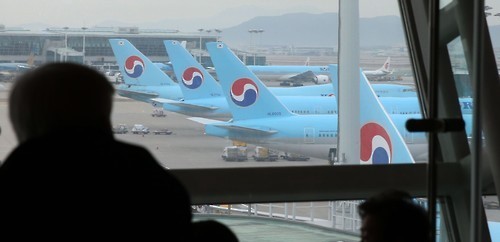- California Assembly OKs highest minimum wage in nation
- S. Korea unveils first graphic cigarette warnings
- US joins with South Korea, Japan in bid to deter North Korea
- LPGA golfer Chun In-gee finally back in action
- S. Korea won’t be top seed in final World Cup qualification round
- US men’s soccer misses 2nd straight Olympics
- US back on track in qualifying with 4-0 win over Guatemala
- High-intensity workout injuries spawn cottage industry
- CDC expands range of Zika mosquitoes into parts of Northeast
- Who knew? ‘The Walking Dead’ is helping families connect
Unionized pilots of Korean Air vote for strike

Korean Air Lines planes are visible outside a window at a departure gate of Incheon International Airport, west of Seoul, on Feb. 19, 2016. Unionized pilots of South Korea’s No. 1 carrier voted for a strike on the day which, if carried out, would be the first in 11 years. The pilots demanded a 37 percent wage hike, while the management offered a 1.9 percent increase. The union said it is not planning on an immediate walkout, but will gradually raise the strike participation level depending on how talks proceed with the management. (Yonhap)
SEOUL (Yonhap) — Unionized pilots of South Korea’s No. 1 flag carrier Korean Air Lines Co. voted for a strike on Friday, in what they claim provides legal grounds for them to engage in labor disputes anytime that could disrupt the country’s air transportation.
In a vote held over weeks, 1,106 workers in the airline company’s pilot union said “yes” to go on strike after their leaders and company representatives failed to iron out differences on wages and other working conditions.
The reading translates into a majority of votes out of the 1,845 registered members of its two labor unions including the Korean Air Pilot Union (KPU).
Korean Air said in a statement that it cannot accept the results, citing “illegality” in its voting process.
The company claimed that there is no list of some union members who cast ballots, saying that it is a violation of the law and that all results should be deemed “invalid.”
Pilots sought a 37 percent hike in wages for themselves, while the company proposed a 1.9 percent increase, which it said is in line with the wage growth rate for other non-pilot workers. The union declared an end to its negotiations with the company late last year.
The pilots cite poor working conditions as their main reason. The average annual salary of 2,340 local pilots at Korean Air is around 100 million won (US$81,000), far lower than that of Chinese airliners that pay 200-300 million won.
Earlier, a local committee in charge of settling labor disputes announced a halt to arbitration. The yes vote on Friday gives legal ground for the union to engage in labor disputes, including a strike, down the road.
The vote for the labor dispute has been extended three times apparently in order to raise participation rates.
But the unionized pilots won’t immediately walk out of work. They instead plan to ratchet up pressure on the management via incremental collective actions.
“We will continue to have talks with the company even in the middle of any kind of labor dispute, while ramping up our push and seeking understanding from all through group actions that are guaranteed by law,” the KPU, which holds over 1,000 members, said in a statement.
A strike would mark the first time since 2005 when its flight service was disrupted by a four-day walkout, which promoted government intervention due to worries over its detrimental impact on the economy and inconvenience caused to passengers.
The company estimated that it suffered around 67 billion won in losses due to canceled flights and other service disruptions.
In the wake of the walkout, the government designated the airline industry as “critical” to the public, making it almost impossible for pilots to go on a full strike.
Even if they do so, they have to maintain at least 80 percent of international flight operations to minimize disruptions. For domestic routes, 50 percent of pilots should remain at work.
Korean Air pilots have been complaining about their relatively small salaries compared to those of foreign airlines, a gap they cite as the main reason for many of their coworkers leaving for higher-paid jobs, mostly in China.
However, they have usually drawn criticism for demanding more at a time when they are already much better paid than other workers and for holding public transportation hostage for their own interests.
















